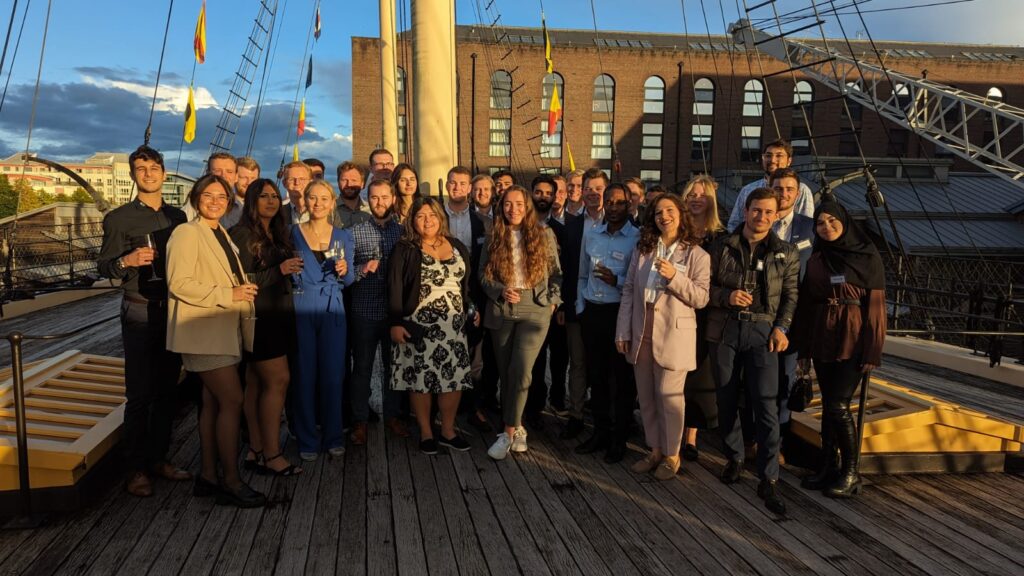Hello everyone!
We are now 3 months into the trainee program, and a lot has happened as we approach the Christmas and New Year celebrations!
What have we been up to during this first period? Well, we’ve been involved in many activities. For instance, we participated as judges representing GKN at Lego League, where the winning team received a prize sponsored by GKN. A few weeks ago, we also went on a study visit to Såtenäs, where we had the exciting opportunity to witness the Saab 39 Gripen take off! This week, we will be hosting the trainee group from Siemens Energy here at Stallbacka to showcase our operations and share more about GKN.
We are currently in the midst of our first rotations, which are approaching their conclusion. It’s time to start looking for new assignments for the next rotation, starting in mid-January for most of us. Here’s a glimpse into what each trainee has been up to during their first rotation:
Elin: With a background in Logistics, it’s no surprise that my first rotation is in logistics, specifically in the Supply Chain Management department. In manufacturing companies with various products, bottlenecks can sometimes occur. My main task during this rotation is to delve deeper into one of these bottlenecks, map and investigate whether we can “widen” the bottleneck through a different or new approach, thereby creating a more stable flow of manufactured products.
Lisa: My first rotation is in the Government and Space program. The program is the business side of the company, involving a lot of customer interaction, negotiation, follow-up, and contract delivery. My mission during this rotation is to explore digitalization possibilities within the business and investigate efficient ways to handle commercial documents. I also assist with quotation work.
Oskar: During the first three months of the Global Graduate program, I’ve worked as a Systems Engineer in the Performance and Controls department. This high-tech department deals with complex issues related to control systems and engine performance. I’ve worked in a relatively small team with incredibly experienced colleagues, providing a solid platform for learning. This period has also given me insight into strategically conducting technical development work in the organization. I’ve had a lot of fun in the department and look forward to applying the lessons learned to my future rotations.
Per-Emil: My first months are spent as a Cost Engineer. In concrete projects at GKN, cost and efficiency are crucial factors. The department I work in supports the majority of projects by creating cost estimates for individual products at different stages. It’s essential to understand the entire production process, identify cost-driving and time-consuming operations, and suggest efficiencies. From my perspective, it’s been very enjoyable to be part of all this. I’ve received a thorough “crash course” in the manufacturing of various components, which I will carry with me to future rotations.
Martin: My first rotation is in the Aerodynamics department. As the name suggests, I work on evaluating the aerodynamics of our components. This rotation mostly involves learning about the workflow for evaluating deviations on a TEC-24k (Turbine Exhaust Case, thrust 24000 lbf). A turbine exhaust case is a structure that directs the air and is placed at the rear of an aircraft engine. This structure has the same function as a TRF (Turbine Rear Frame), but Pratt & Whitney calls it TEC, and General Electric calls it TRF. Practically, I mainly work on automating a simulation flow by coding Python scripts.
Axel: I am doing my first rotation in the GTC – Future Concepts department. My department is heavily involved in research and projects related to future aircraft engines and the aviation industry as a whole. My mission here is to model various emission methods for nitrogen oxides. Nitrogen oxides are one of the emissions, after carbon dioxide emissions that have the most significant negative impact on the atmosphere. Therefore, it’s important to investigate the subject and be able to calculate and simulate the amount of nitrogen oxide emissions in future engines.
Felix: My first rotation is in a department with sixteen engineers with different expertise in material processes such as casting, forging, and additive manufacturing. I specifically work on castings for the Turbine Rear Frame (TRF), which is a frame for the GEnx engine used in both Boeing 787 and 747. The TRF is mounted around the low-pressure turbine at the back of the jet engine and straightens the gas flow to achieve efficient aircraft propulsion. It also has engine mounts that allow the engine to be attached to the aircraft wings. The thrust at takeoff for the GEnx is up to 76000 lbf per engine, quite impressive!
Merry Christmas and Happy New Year from us trainees!
